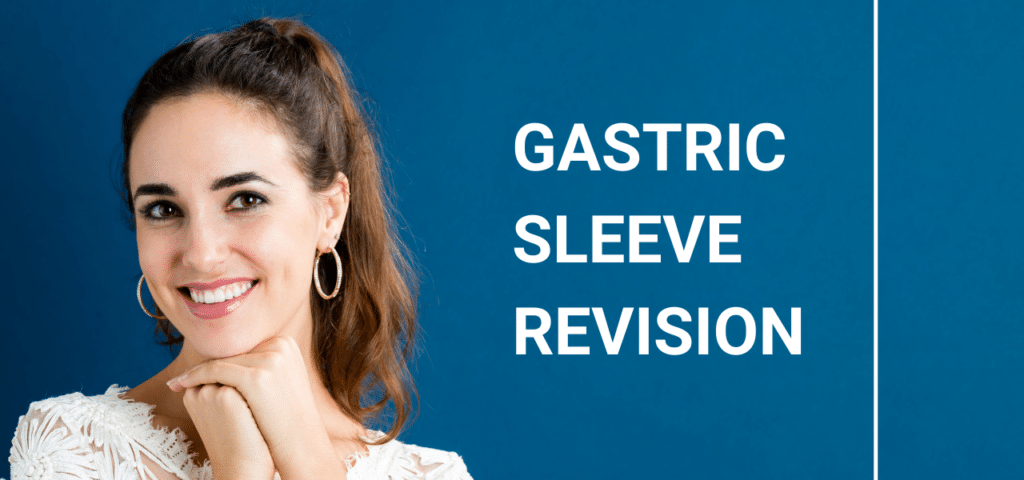Gastric sleeve surgery has become one of the most common surgeries performed to help facilitate weight loss. Many patients see a considerable amount of weight loss in the first 12 months. However, results vary, and not every patient experiences the same amount of weight loss. In some cases, gastric sleeve surgery does not produce the expected weight loss results or patients experience chronic unpleasant side effects. Approximately 10% to 30% of the people who have gastric sleeve surgery seek some type of revision within the first 24 months.
What Is Gastric Sleeve Surgery?
Gastric sleeve surgery (LSG) is a surgical procedure to help an individual with a body mass index (BMI) is 40 or above to lose weight.
The surgeons remove approximately 80% of a patient’s stomach and stitch the remainder back together during the surgery. This procedure makes the stomach much smaller and tube-shaped, thus limiting the amount of food that a person can eat at one time. Gastric Sleeve surgery requires a 1-3 day hospital stay and between 4-6 weeks of recovery time.
Can You Get the Surgery Twice?
If you have undergone gastric sleeve surgery and are not achieving the expected weight loss or dealing with unpleasant side effects, you may be wondering if a revision is possible. Fortunately, the answer is yes. Additionally, a revision can assist in continuing your weight loss journey, and in certain cases, opting for a different procedure may prove to be the best solution.
Why Would A Gastric Sleeve Revision Be Necessary?
There are a few reasons why a gastric sleeve revision would be necessary:
- One common reason for a gastric sleeve revision is insufficient weight loss within the expected timeframe. Rarely, this is caused by inadequate removal of stomach tissue during the initial surgery.
- Another reason a revision might be done is due to weight gain after surgery. About ⅓ of all patients who have had gastric sleeve surgery experience weight regain between 2 and 5 years post-surgery.
- In rare cases (less than 2%), gastric sleeve surgery can lead to chronic side effects like acid reflux or hiatal hernia. Dietary changes or medication can often manage these symptoms, but sometimes a revision can be necessary to provide relief.
What Causes Weight Gain After the Surgery?
As per the American Medical Association’s journal, around 50% of patients faced significant weight gain five years after laparoscopic sleeve gastrectomy. Research has also shown that the failures in gastric sleeve surgery most often revolve around the patient’s lifestyle choices.
Failing To Follow Dietary Plan
The most crucial element for obtaining the maximum weight loss results after gastric sleeve surgery is portion control. If the patients’ are not paying attention to how much food they are eating, or they are consuming liquids too soon after eating, they might consistently be overeating which can enlarge and stretch out the stomach. As the stomach stretches out it will allow the patients to eat more food at each sitting causing the patient to gain weight and the stomach will continue to stretch. This becomes a revolving cycle until the stomach allows for larger portions resulting in more and more weight gain. It is possible for the stomach to stretch so much it almost reverts back to its original size.
Failing To Get Adequate Exercise
Second, to portion control, physical activity is a key element in losing weight and keeping it off. Gastric sleeve surgery (ESG) is an aid to help individuals lose weight but the process requires the participation of the individual to be successful.
Failing to Utilize Support Systems
There are many causes of obesity, which can be complex and are often considered a disease. Extensive research has linked obesity to various factors such as metabolism, genetics, stress, hormonal impairments, menopause, psychological, and neurological reasons. Considering this, it’s logical to question how individuals who have undergone gastric sleeve surgery can successfully lose weight and maintain it without a support system.
After undergoing any type of bariatric surgery it is important to engage in different types of support groups. The doctors recommend that the patient seek psychological assistance as well as support from family, friends, and others who have gone through the same procedure.
Doctors who perform bariatric surgery have one goal in mind – to help their patients become healthier individuals through weight loss. Many doctors require that their patients participate in ongoing support as criteria for surgery qualification. Your doctor can give you information on specific groups that can help you in your weight loss endeavor. You should not, and do not, have to go through this process alone.
How Do You Know If You Need A Gastric Sleeve Revision?
Gastric sleeve surgery is not in itself a weight loss plan, it is an aid to help a patient reach their weight loss goals. Making significant lifestyle choices and strictly adhering to them is what will most often result in success. You may need a gastric sleeve revision if you are:
- Not losing weight as expected -Post-surgery weight gain, known as “rebound weight,” is normal. If your diet and exercise efforts aren’t yielding expected results, complications from gastric sleeve surgery may be a factor.
- Re-gaining weight after initially losing it as expected can be a sign that the stomach has stretched out and needs to be reduced again.
- Experiencing Chronic Acid Reflux can be an unpleasant side effect that can not be alleviated through medication or dietary changes.
- Vomiting/Nausea
- Having Other complications from surgery
Can A Revision To Gastric Sleeve Surgery Be Done Another Way?
Yes, you can have a different type of bariatric revision surgery if your gastric sleeve surgery failed. Your doctor will discuss your options with you and recommend a plan to get you back on track.
Failed gastric sleeve surgery? Consider gastric bypass, mini gastric bypass, duel Duodenal switch, or another sleeve procedure.
Endoscopic sleeve gastroplasty (ESG) is a fairly new non-surgical gastric sleeve option that you may consider.
What Is Endoscopic Sleeve Gastroplasty?
Endoscopic sleeve gastroplasty is a non-surgical procedure that reduces the size of the stomach using sutures instead of removing a portion of the stomach.
ESG, like laparoscopic gastric sleeve surgery, requires general anesthesia. However, ESG has a shorter surgery time, no hospital stay, and a faster recovery of about a week. It can also be used to modify a previous laparoscopic gastric sleeve.
How Much Weight Can You Lose With the Procedure?
Most patients who have a revision to their gastric sleeve surgery lose between 55 to 75 lbs for every hundred pounds they are higher weight.
Is Gastric Sleeve Revision Usually Successful?
The results of each patient will vary, depending on the type of revision opted for. Generally, patients can lose up to 55% of the regained weight through a revision. However, for successful weight loss, patients must also commit to strict lifestyle changes, including diet and exercise.
If you were unable to achieve your desired weight loss after undergoing bariatric surgery, reach out to us today. Additionally, we will personally discuss your weight loss goals and help create a customized plan to assist you in reaching them. Furthermore, at IBI Healthcare Institute, we actively commit to support you on your weight loss journey.










